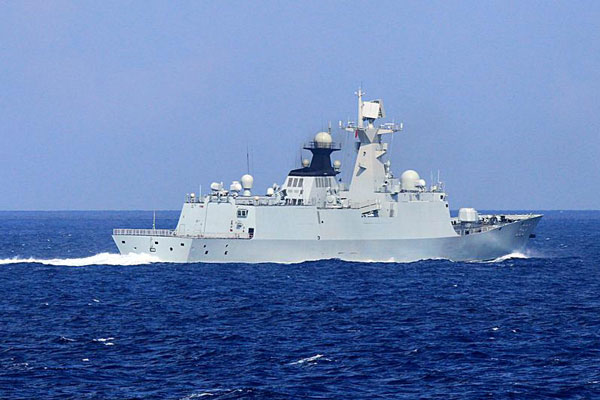Steady pursuit of peace, but ready for anything
Updated: 2016-04-25 07:32
(China Daily)
|
|||||||||
 |
|
A warship sails in South China Sea during a Chinese navy drill in South China Sea, July 28, 2015. [Photo/CFP] |
Washington deservedly received a warning and reminder from Beijing about the dangers of saber-rattling, after US warplanes conducted what the United States called a freedom of overflight operation near China's Huangyan Islands.
This seems a weird claim since planes of all countries pass through the airspace without any trouble. The same is true of the US' so-called freedom of navigation operations.
The US military appears obsessed with something that is simply not an issue.
But what is happening, and may come up next, in the South China Sea goes far beyond jurisprudential common sense as well as divergent readings of international law.
It is because of geopolitical calculations rather than international justice that Washington is rushing to the forefront of the maritime disputes with Beijing. It is dusting off its long-neglected military alliance with the Philippines. It is seeking closer military relationships with India and Vietnam. It is dragging the Japanese military into the South China Sea.
Despite all the ear-pleasing diplomatic rhetoric from Washington, about not choosing sides, about peace and negotiated solutions, the hawkish Pentagon is making it increasingly clear that it will not give up until real trouble emerges in the South China Sea.
The China-US standoff is going beyond the exchange of verbal swords, and is increasingly taking the form of hostile, though as yet by-and-large restrained, military encounters.
Beijing's aspiration for a new-type major-country relationship is a blessing for all peace-minded countries and peoples. But it takes two to tango. In the South China Sea, at least at this moment, the US does not want to dance with China.
Washington may not acknowledge it, but the two countries' militaries appear to be on a collision course.
Which is why Beijing must be prepared.
However, things are not yet irreparable. As long as Beijing considers the South China Sea a core national interest, as long as it prioritize development at home, as long as it remains committed to sustaining a peaceful environment for domestic development, as long as it aspires to become a different kind of big power, it should avail itself of every possibility to avoid military solutions to territorial disputes.
The consensuses Foreign Minister Wang Yi has achieved in his visits to Brunei, Cambodia and the Laos are laudable diplomatic attempts that help set the stage for broader consultations.
Since real solutions rest ultimately on agreements between China and claimant countries, Beijing should work harder to seek breakthroughs through one-on-one negotiations.
Related Stories
Chinese FM sees 'dual-track' approach practical, feasible solution to South China Sea issue 2016-04-21 21:16
China dissatisfied with British comment on South China Sea 2016-04-21 00:02
US actions cause of tensions in South China Sea 2016-04-20 07:51
China, Russia oppose internationalizing South China Sea dispute 2016-04-19 05:09
PLA carries out historic medical mission in South China Sea 2016-04-18 09:59
Beijing warns over US-Philippine joint patrols in South China Sea 2016-04-14 22:01
Today's Top News
Chinese runners flood London for marathon
Chinese philanthropists explore British way of 'giving'
Back on the up
China leads way on US adoptions
Ericsson reshapes and sees Q1 profit rising
Snowden sues Norway to seek safe travel to get prize
Nation's drones are in demand
Beacons and gun salutes as Queen turns 90
Hot Topics
Lunar probe , China growth forecasts, Emission rules get tougher, China seen through 'colored lens', International board,
Editor's Picks

|

|

|

|

|

|







